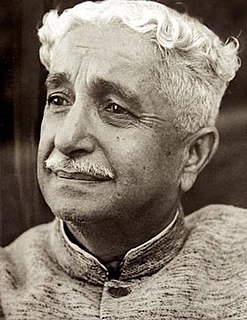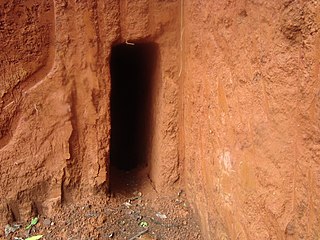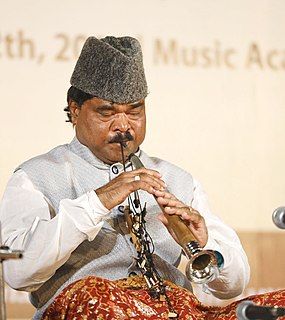
Kuppali Venkatappa Puttappa, popularly known by his pen name Kuvempu, was an Indian poet, playwright, novelist and critic. He is widely regarded as the greatest Kannada poet of the 20th century. He was the first Kannada writer to receive the Jnanpith Award.

D. Veerendra Heggade is an Indian philanthropist and the hereditary administrator (Dharmadhikari) of the Dharmasthala Temple. He succeeded to the post at the age of 19, on October 24, 1968, the 21st in his line. He administers the temple and its properties, which are held in trust for the benefit of devotees and of Dharma. He is a nominated Member of Parliament in the Rajya Sabha since July 2022.

Bannanje Govindacharya was an Indian philosopher and Sanskrit scholar versed in Veda Bhashya, Upanishad Bhashya, Mahabharata, Puranas and Ramayana. He wrote Bhashyas or commentaries on Veda Suktas, Upanishads, ShataRudriya, BrahmaSutra Bhashya, Gita Bhashya and was an orator. He was awarded the Padma Shri by the Government of India in 2009.

Chandrashekhara Kambara is a prominent Indian poet, playwright, folklorist, film director in Kannada language and the founder-vice-chancellor of Kannada University in Hampi also president of the Sahitya Akademi, country's premier literary institution, after Vinayak Krishna Gokak (1983) and U.R. Ananthamurthy (1993). He is known for effective adaptation of the North Karnataka dialect of the Kannada language in his plays, and poems, in a similar style as in the works of D.R. Bendre.

Devegowda Javaregowda, known as De Ja Gou or simply Javaregowda, was an Indian Kannada writer, folklorist, researcher, scholar and academic. He was disciple of authors T.N. Srikantaiah and Kuvempu. His literary career spans over decades in which he wrote over thirty-four biographies in Kannada language and other works including children's literature. He campaigned for the promotion of Kannada language. He had received Pampa Prashasti (1998), Padma Shri (2001) and the Karnataka Ratna (2008) awards for his contributions in literature and education. He became a centenarian in 2015 and died on 30 May 2016.
The Halakki-Vokkalu are an indigenous tribe of Karnataka, India. They are found predominantly in Uttara Kannada district and are distinct from Vokkaligas.

Suranga is a traditional water management system used to provide a reliable supply of water for human settlements and irrigation in Kasargod district of Kerala and Dakshin Kannada district of Karnataka, India. A suranga is basically a horizontal tunnel dug in the slope of a laterite hill for about 30 metres (98 ft) to 40 metres (130 ft), which uses gravitational force for extraction of the underground water and collect into a storage tank. As both the areas are covered by uneven and steep laterite hill which makes boring of traditional bore well hard and expensive, surangas are considered as a relatively cheap option.

Devanoora Mahadeva is an Indian writer and intellectual who writes in Kannada language. The Government of India conferred upon him the Padma Shri award, the fourth highest civilian award.

Pandit Dr. S. Ballesh, born Ballappa Sanna Bharamappa Bhajantri, is an Indian classical Hindustani shehnai player. One of the most well-known disciples of shehnai player Bharat Ratna Ustad Bismillah Khan, he is an expert in Benares gharana shehnai playing, and a Patiala gharana Hindustani vocalist, ghazal singer, Indian Playback singer and musician, often referred by the title Panditji and BadeGuruji. Ballesh is credited with popularizing the shehnai, a reeded woodwind instrument. While the shehnai had long held importance as a folk instrument played in traditional ceremonies in India, Ballesh is credited with elevating its status and bringing it back to the centre stage. He plays often for Prasar Bharati's All India Radio (AIR) and Doordarshan.
Madappa Mahadevappa, popularly known as Rice Mahadevappa was an Indian agricultural scientist and plant breeder, renowned for developing high yielding hybrid varieties of rice. He served for more than 55 years and had a glowing career. He served as the Vice-chancellor of University of Agricultural Sciences, Dharwad for two terms and his selfless hard work along with broad vision lead to the award of ICAR's SARDAR PATEL OUTSTANDING INSTITUTION award in the year 2000 to UAS, Dharwad. He served as chairman of Agricultural Scientists Recruitment Board under Indian Council of Agricultural Research of which he was a member of governing council. As chairman of ASRB, he introduced radical changes to create transparency in recruitment and expedited the process of promotions. This enhanced the talent pool at ICAR system to further contribute to the cause of the agriculture and farming community. He was the recipient of Padma Bhushan, India's third highest civilian honour, Padma Shri and various other accolades.

Padma Shri recipient Harekala Hajabba is an Indian social activist and orange vendor living and working in the city of Mangaluru, Karnataka, India. He saved money from his business to build a school in his village. In 2020, he was awarded the Padma Shri, India's fourth-highest civilian award, for his initiative and achievement.

Sulagitti Narasamma was an Indian midwife from Pavagada town, in Tumkur district of Karnataka state. She performed more than 20,000 traditional deliveries free of charge over a 70-year period of service in deprived regions of Karnataka with no medical facilities. Her work was honored with the National Citizen's award of India in 2012 and the country's fourth highest civilian award, the Padma Shri, in 2018.

Chintala Venkat Reddy is an organic farmer known for his soil and nutrient management techniques in farming. He is the first independent farmer in India to receive an international patent for his technique in soil swapping and soil fertility.
Subbanna Ayyappan is an Indian aquaculture scientist hailing from the Karnataka State who has held several key positions in various Govt organisations related to agricultural science. He was the Director-General of Indian Council of Agricultural Research (ICAR) and Secretary to Government, Department of Agricultural Research and Education (DARE) during Jan 2010 – Feb 2016. He was also the Chancellor of Central Agricultural University, Manipur. He was instrumental in bringing about the Blue Revolution in India. He was the first non-crop scientist to head the ICAR.
Dhaneswar Engti is a poet-author from the Indian State of Assam promoting the use of the endangered Karbi language spoken by the Karbi people of Northeastern India. Engti has authored 19 books and written around 100 songs in the Karbi language. He has also served as the Joint Secretary of Karbi Anglong Autonomous Council. In the year 2022, Govt. of India conferred on him the Padma Shri award for his work towards the preservation and advancement of indigenous languages.
Om Prakash Gandhi is a social worker from the Indian State of Haryana dedicated to the cause of girl child education.
Thavil Kongampattu A V Murugaiyan is a thavil player from the Puducherry Union Territory in India.
Abdul Khader Nadakattin is a grassroots agricultural innovator, a social worker and an environmentalist from Dharwad in the Indian state of Karnataka. He is credited with more than 40 innovations that assist small and marginal farmers. His famous innovations include a tamarind seed separation device, a ploughing blade making machine, a seed cum fertilizer drill, a water-heating boiler, an automatic sugarcane sowing driller, and a wheel tiller. In the year 2022, Govt of India honoured Abdul Khader Nadakattin by conferring the Padma Shri award for his contributions in the field of grassroots innovation.
Chirapat Prapandvidya is a Thai archaeologist, Sanskrit scholar and an Indologist. He was the founder and the first Director of Sanskrit Studies Centre at Silpakorn University in Bangkok. He has also published over a hundred articles on Sanskrit and Indology. In the year 2022, Govt of India honoured Chirapat Prapandvidya by conferring the Padma Shri award for his contributions to literature and education.
Daitari Naik also known as Canal Man of Odisha is an Indian agriculturalist. In 2019, he has been awarded Padma Shri by the Indian Government for his contribution in agriculture.











